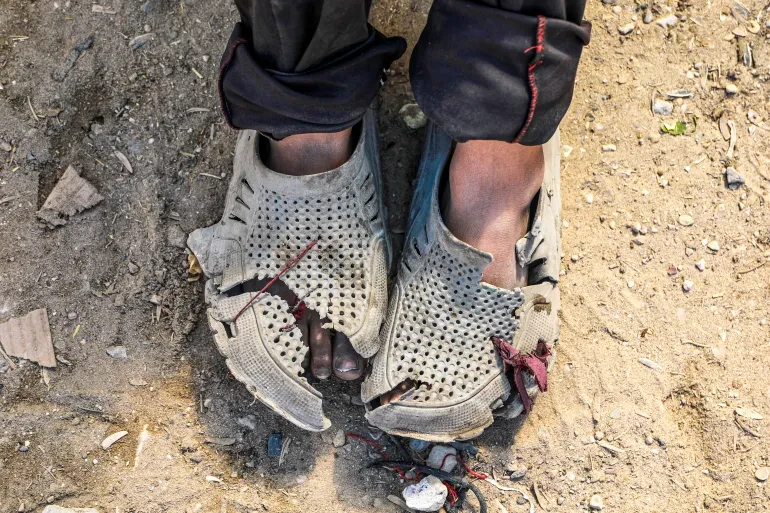Iran’s Plan to Strike Back Against the U.S.
Iran’s Military Preparations Following U.S. Attacks
Loading...

Children are underdressed and exposed to the elements a year into Israel’s war on Gaza.
A Year of War and Its Toll on Families
As the conflict in Gaza continues into its second year, families are grappling with the harsh realities of displacement and poverty. Children are particularly vulnerable, often underdressed and exposed to the elements. In Deir el-Balah, a mother named Rawan Badr embodies the struggles faced by many parents in the region. Standing outside her tent in a displacement camp, she hangs her children's tattered clothes on a line, her weary face reflecting the weight of her circumstances.
Memories of Better Days
Badr's six-year-old daughter, Massa, remains a beacon of joy amidst the despair. Full of energy, she plays and chats animatedly, yet her innocence is tinged with longing. Before the war, Massa delighted in dressing up in colorful outfits, but now her wardrobe consists of faded, patched garments that barely hold together. Badr recalls the day they fled Gaza City, taking only a few belongings, believing they would return home soon. However, as the months dragged on, despair set in. “I left everything behind,” she laments, noting how her children’s clothes have deteriorated from constant wear and inadequate washing.
Massa often asks about her favorite outfits, including a cherished red dress worn during Eid. Badr struggles to provide comfort, telling her daughter they will return home “tomorrow,” even as she knows that hope is fading.
The Challenge of Providing for Children
Like many parents in Gaza, Badr tries to buy clothes for her children when she can spare some money. Unfortunately, her options are limited to second-hand items that often don’t fit properly. She resorts to visiting local tailors who can make minor alterations, but the process is fraught with challenges. When she had to purchase a new pair of shoes for Massa, it cost around $40—an expense that meant sacrificing food for the week.
In the bustling market of Deir el-Balah, two professions have become essential: tailors and cobblers. These craftsmen work tirelessly to mend the worn-out clothing and shoes of displaced families. Raed Barbakh, a tailor, shares his experience of working long hours to meet the demands of his community. “For the first time in 10 years of being a tailor, I hate my job,” he admits, reflecting on the heartbreaking requests he receives, such as turning a single shirt into two for a child.
The Strain of Daily Survival
Nearby, Saeed Hassan, a cobbler, faces similar challenges. Surrounded by shoes in need of repair, he examines each pair carefully, often confronted with items that are beyond saving. “Sometimes, people bring me shoes that cannot be repaired, but they ask me to try anyway,” he explains. The desperation of parents is palpable, as they seek any solution to provide for their children.
Hassan recalls a particularly poignant moment when a man approached him with foam pieces, asking him to create shoes for his children. “I can’t do that!” Hassan chuckles, recognizing the futility of the request. The streets of Gaza are harsh, and makeshift solutions often fall short.
Exhaustion and Resilience
As the war drags on, parents like Badr, Barbakh, and Hassan find themselves exhausted by the relentless struggle to provide for their children. The emotional toll is immense, as they navigate the challenges of daily life in a war-torn region. “People are exhausted by how intense it is simply to find solutions for the children,” Hassan reflects, capturing the collective sentiment of a community in crisis.
In the face of overwhelming adversity, the resilience of Gaza's families shines through. They continue to seek ways to bring a semblance of normalcy to their children's lives, even as the fabric of their existence frays around them.
Editor
Iran’s Military Preparations Following U.S. Attacks
Troops remain in five strategic locations, raising fears of renewed tensions and long-term occupation.
Opposition forces have taken control of the capital after a significant offensive. Here is how it unravelled.
